 |
1944 ~ 2011 |
 |
Historical Research
|
This photo was taken during WWII
in Elisabethville, Aubergenville* about 25 miles west of Paris. On the photo,
you can see an American POW taken to the
Standortkommandantur by 6 German soldiers.
Facing the soldiers, a daring French civilian makes a military salute to
greet the American serviceman and at the same time tease the German soldiers.
This page summarizes the historical research that was
done in order to identify the POW and contact his family
*On the left bank of the Seine, about
halfway between Les Mureaux and Mantes-Gassicourt.
|
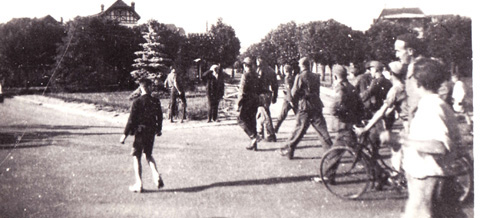
Click here
to view full size photo |
Context
|
When I
was a child I was often told the fascinating
story of a tall American airman who had
landed in a tree in Elisabethville and was
immediately arrested by the Germans. Details
of the story
here. I
was always wondering what had happened to
the airman and hoping he could safely come
back to the United States in 1945. My
parents were aware of the existence of the
photo however nobody could locate it after
my grand-parents house was sold in the
1970's. In November 2010, however, my aunt
found the photo in a drawer and my father
emailed me a scan. I had heard the story so
many times, seeing a photo of the real thing
was an incredible experience. This
fascinating photo tells a story on its own
and I spent hours studying every details:
the American POW, the French civilians, the
German soldiers... I immediately decided to
do some historical research in order to ID
the POW, get in touch with him and/or his
family and share the photo with this
American family. |
|
|
APPEAL FOR WITNESSES
If you
have some information about this
event, feel free to contact us by
using the form
below
|
|
With the help of several historians, we could in a little less than 3 months
ID the airman and get in touch with his family. They
immediately decided to fly to France and I am now looking forwards to
meeting them in Roissy airport on April 14, 2011!!!
The information
at hand
To get started with the research, I
had the following information:
1) A handwritten annotation on
the back of the photo:
| |
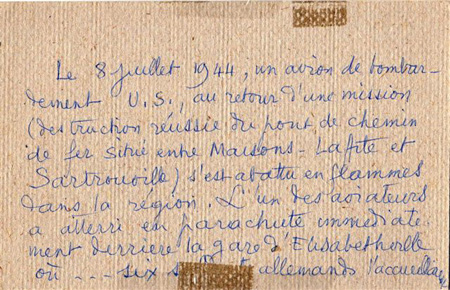 |
Transcription:
" Le 8 Juillet 1944, un avion de bombardement U.S., au
retour d'une mission (destruction réussie
du pont de chemin de fer situé entre
Maisons-Laffitte et Sartrouville) s'est
abattu en flammes dans la région. L'un des
aviateurs a atterri en parachute
immédiatement derrière la gare
d'Elisabethville où... six soldats
allemands l'accueillaient . "
English
Translation:
"On July 8, 1944, a US bomber, back from a
mission (successful destruction of the railway
bridge located between Maisons-Laffitte and
Sartrouville) was shot down in flame in the
region. One of the airmen landed with his
parachute just behind Aubergenville-Elisabethville
railway station where… six German soldiers
welcomed him.”
|
2) My Dad's testimonial (he was 8 years old in 1944 and
he was in his garden when the event unfolded). His testimonial can be
summarized as follows: he
saw allied airplanes flying in the
direction of Paris. They were perfectly aligned, all flying at the same
altitude. A short while afterwards, he saw the same airplanes flying in the
opposite direction (towards the UK). They were in a complete mess, all
flying at different altitudes etc. Two were on fire... then he saw a
parachute (or maybe several parachutes; he is not sure) popping out of one of the two
bombers on fire... From his garden, my Dad saw the parachute landing close
to the railway station. My Dad also remembers it took place some time after
D-Day, most probably end of June or early July 1944.
3) A story that was verbally
transmitted to me.
Details here
4) Long shadows pointing eastwards indicating the photo
was taken in the evening
The Research
Starting with the annotation, we quickly realized there
was a problem: the railway bridge between Maison-Laffitte and Sartrouville
wasn't bombed on July 8. The last bombing of that bridge took place on June
24. Therefore, either the date was wrong or the target was wrong. Or both
were wrong...
|
Daniel Carville (http://www.francecrashes39-45.net) investigated the MACR
(Missing Air Crew Report) of all the allied airplanes that crashed over France on July
8, 1944. Fitfty seven (57!) allied aircraft crashed on that day alone... but none
of these crashes could account for an airman landing in a tree in
Elisabethville... Therefore the date is probably wrong.
Daniel then investigated the MACR related to the
successful bombing of the Sartrouville-Maison-Laffitte railway bridge on June 24, 1944 and
he could find interesting information: Two B26 bombers were hit by flak and
crashed in the region of Elisabethville. Details of the MACR are available
on the following URL:
B-26 Marauder B-55-MA - 42-96120:
http://www.francecrashes39-45.net/page_fiche_av.php?id=3424
B-26 Marauder B-55-MA - 42-96121:
http://www.francecrashes39-45.net/page_fiche_av.php?id=3425
The first one crashed in Flexanville about 15 km of Elisabethville. In his
escape report, Capt Moses J. Gatewood (serial number O-743752) says he landed in the vicinity of
Flexanville and that after his parachute opened, he counted 5 chutes around
him. There were 6 airmen on that B26 and this means they all landed in the
vicinity of Flexanville ie about 15 km from Elisabethville. Besides, copilot
Richard Haymond confirmed that he was
encircled with the other 5 crew members and
immediately arrested by the Germans. None of these
men could have landed near Aubergenville-Elisabethville railway station.
That B26 is therefore ruled out.
|
|
|
Francecrashes39-45.net
Each time an allied airplane went
missing in action, the military
authorities filed a MACR: Missing
Air Crew Report. These MACR are
available online; However they are
in scanned format and the
information is therefore
inaccessible to search engines such
as Google. That's where Daniel
Carville comes in: he is currently
analyzing each and every MACR
pertaining to allied aircraft lost
over French territory and files the
most relevant information in his
database. His database can be
searched online and is therefore
extremely useful for historians and
researchers. Between 8,000 and
10,000 aircrafts
went missing over France and the
task is tremendous... So far, he
analyzed 3150 crashes and the work
is far from over...
Francecrash39-45.net is actually
much more than a useful tool for
researchers: in a way, it's an
online memorial for the thousands of
airmen who fought and died for the
freedom of France and Europe. Most
of these airmen were young men in
their early twenties coming from
various countries: the United
States, United Kingdom, Canada,
Australia, New Zealand, South
Africa, Poland, Norway... We owe
them our freedom and we should never
forget their sacrifice. |
|
The other B26 crashed in Arnouville-lès-Mantes about 8 km
from Elisabethville. In his
escape report, 2Lt William E. Giffhorn says he
landed near Epône. Another evader from the same B26, Sgt William F. Koenig
says in his
escape report
that he landed near Goussonville. Looking at the map, we can see that
Elisabethville, Epône, Goussonville and Arnouville-lès-Mantes are
aligned. Furthermore,
Didier Masfrand (http://grmcae.jimdo.com)
forwarded us an
article published on November
8, 1944 in local newspaper "Courrier de Mantes" stating that the day Giffhorn landed near Epône, another airman from the same B26 was made
prisoner near Aubergenville railway station!
This means we have very strong evidence that the man on
the photo jumped from that very B26.
Three Airmen in Epône (Vicinity of
Elisabethville)
|
Bruno Renoult put me in touch with Marianne Heloin Vanura of
Epône. Marianne spoke to several senior citizens of Epône and gathered
fascinating information about what happened there on June 24, 1944.
Back in 1993, she met Aurélien; Aurélien was 17 in 1944 and was working as trainee
in a pharmacy. After the liberation, during the 1944-45 winter (one of the
coldest winters on record), he saw a woman named Lucienne
Laprêté coming to the pharmacy. She was wearing a USAF vest.
Puzzled by the military vest, he questioned her and she told him it was the
vest of an American airman called Giffhorn who had landed close to her place
and that she hid him for the night. She was sick and the weather was so cold during that
winter that she was happy to be able to wear Giffhorn's military vest! A few
days ago, Marianne managed to meet with Odette (now 85), the niece of
Lucienne
Laprêté
and Odette confirmed that her aunt was sharing her life with a man called
Nestor Lambin. Nestor Lambin is the name of the "patriot" featured in the
"Courrier de Mantes" article
dated November 8, 1944! After further investigation, Marianne managed to
locate the place where Nestor Lambin and Lucienne Laprêté were living. After
the war, the place was bulldozed during the construction of highway A13 (A
2x3 lane highway linking Paris to Normandy) and is now close to a rest area...
|
|
|
Vexin Histoire
Vivante
Bruno Renoult wrote 8 fascinating
books (in French) about the
liberation of the Paris area in
1944. A set of five volumes provide
an overall view of the liberation of
the region. Three other books
focus on more specific events: the
liberation of the Vexin region, the
liberation of Mantes, and finally a
book covering the dramatic events
that unfolded in Northern Yvelines
in August 1944 when the German
counterattacked and claimed back
territory that had been previously
liberated a few days before.
His books can be purchased online on www.vexinhistoirevivante.com
|
|
|
Marianne also talked to a woman
who was 14 in 1944 and remembers seeing a airman landing in her backyard on
June 24, 1944 around 19.30. The German soldiers rushed uninvited through her
house in order to access her backyard and arrived there seconds before the
airman touched ground. Her Dad was fluent in German and decided to annoy the
Germans soldiers by saying: "Don't walk on the small apple trees that I
recently planted!" Odette also saw another airman touch ground some distance
away. Important detail:
She confirmed that none of these two men landed in a tree.
This means that on that day, 3
American airmen were seen in Epône: Giffhorn near what is now a rest area on
highway A13, an airman in Odette's backyard and a third one in a field some
distance from Odette's house. |
|
|
Marianne Heloin Vanura
Marianne is the author of "Les
Mémoires d'Aurélien ou la Vie à
Epône pendant la guerre d'un
apprenti pharmacien". She is in
close contact with the Veterans
association of the 314th Inf.
Regiment (79th ID) et 79th Recon
Troop and regularly translates
articles between English and French.
Most notably, she translated the
autobiography of a Lt of the
3rd Platoon of the 79th Recon Troop
and the story was featured on an
Australian TV Channel in 2003.
|
|
2Lt Ossian Arthur Seipel
Both 2nd
Lt Giffhorn and Sgt Koenig say in their
escape reports that they were told by the French that 2nd Lt Seipel had been
turned in to the Germans by French collaborators. However, I managed to get
in touch with 2nd Lt Ossian Seipel and his daughter and they forwarded me an
extract of his memoirs. 2nd Lt Seipel tells a completely different story: he
landed in a field where several Frenchmen were working. The French signaled him
that there were Germans all around the field; the 2nd Lt was arrested by the
SS shortly afterwards and taken to the German garrison in Elisabethville.
The information gathered by 2Lt Giffhorn and Sgt Koenig were hearsay from
the underground and hearsay should always be taken with a grain of salt.
2Lt Seipel
explains that he landed in a field at the intersection between a highway and
a railway. As of 1944, there was only one such intersection on the path of
the B26: the intersection between highway N13 (now D113) and the railway
going south towards Versailles. Interestingly, 2Lt Giffhorn says that during
his drop, he saw 2Lt Seipel in a field with several Frenchmen about 500
yards from him. This intersection is precisely 500 yards south of the little
farm where 2Lt Giffhorn spent his first night!
Sgt James Weldon Mellody
In the
MACR, we could find the English translation of a
German document that caused us some headache. This documents states that
Sgt Mellody was captured by the SS at around 20.30 (ie more than one hour
after the crash) at les Alliettes near Saint-Germain. We couldn't find "les
Alliettes" on the map and a search on Google and Google Earth didn't yield
anything. Could it be "Les Alluets-le-Roi" (8 km SE of Elisabethville) or "Forêts
des Alluets", a forest that borders Aubergenville to the south?
Besides,
when reading that report, we gather the impression that the Germans thought
that Sgt Mellody had jumped from another B26: a B26 that crashed avenue de
la Fontaine in Maisons-Laffitte, a short distance from the target. All 6
airmen on that bomber were killed during the crash. How could the German
think that Sgt Mellody could have safely bailed out from that B26 and walk all the
way to Les Alluets-le-Roi, or "Forêt des Alluets" or an unidentified
location called les Alliettes in the vicinity of St Germain?
This
report therefore seemed suspicious; maybe not properly translated or maybe
the German who wrote the report somehow messed up the information that was
given to him verbally.
I then
received an email from Sgt Mellody's daughter-in-law; she told me that Sgt
Mellody had told them that he had landed in a tree and was immediately
arrested by the Germans. This means this German report had to be dismissed.
A dog tag in a field
In the
1990's, a Frenchman found Sgt Edwards dog tag in a field and historian
Mme Josselyne Lejeune-Pichon managed to get in touch with Sgt Edwards in
1997. In
his letter, Colonel Edwards (yep the Sergeant later became Colonel!)
explained the chain broke when the Germans caught him. This suggest that his
arrest was somewhat violent.
Identification of the Airman on the Photo
Now let's have a look at the information we have about
each of the 7 airmen onboard that bomber:
X
1)
2Lt William E. Giffhorn (serial number O-747691):
Landed near Epône and was not made prisoner
X
2)
Sgt William F. Koenig (serial number 19147442): Landed
near Goussonville and was not made prisoner
X
3)
1Lt Freal Charles Knox
(serial number O-684353): Sgt Koenig
says pilot was still onboard when he bailed
out. This means 1Lt Knox touched ground far
from Elisabethville. He was actually seen
landing in Arnouville a
few hundred meters from where the plane crashed.
I later got in touch with his son and wife
and they both confirmed that the man on the
photo is not Freal Knox.
X
4)
2Lt Ossian Arthur Seipel
(serial number O-695772): 2Lt Seipel landed in a field in Epône.
When he saw the photo, he immediately said
that it was not him.
X 5)
Sgt Norman Charles Edwards
(serial number 33558570): The
violent circumstances of Sgt Edwards capture
means he is not the man on the photo.
At this point, we are left with 2 airmen:
Sgt Mellody and Sgt Ornstein. One landed in a tree near Aubergenville-Elisabethville
railway station and the other one on the ground in Epône.
X
7) Sgt Jerome Ornstein
(serial number 36736362): Landed on the
ground in Epône. (Click
here to see his photo)
 6)
Sgt James Weldon Mellody
(serial number 18178493):
Landed in a tree and then
arrested by the Germans. Sgt Mellody is
therefore the man on the photo!
6)
Sgt James Weldon Mellody
(serial number 18178493):
Landed in a tree and then
arrested by the Germans. Sgt Mellody is
therefore the man on the photo!
|
Unfortunately,
Sgt Mellody left us in 2004. I wish I could have
done this research earlier; I would have loved
meeting him. Sharing the photo with his family was a
wonderful experience. They were so excited they
immediately decided to come to France. The Mellody's
came to France on April 14, 2011 and we
spent 4 wonderful days with them. We visited
the Normandy beaches and walked in Sgt
Mellody's steps in Elisabethville. It was
like a dream coming true.
In
March 2012, we flew to States and spent a
wonderful week in rural Texas with the
Mellody family.
Click here for
more photos |
|
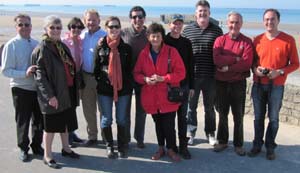
© Seconde-Guerre-Mondiale.com |
Here are two photos his family
sent me. Note that the crew shown on the photo was
not his usual crew.
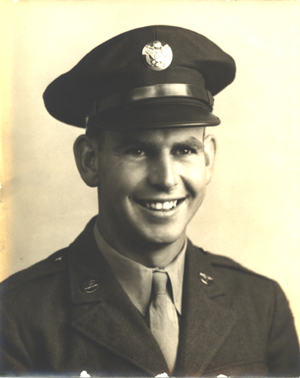
Sergent James Weldon Mellody |
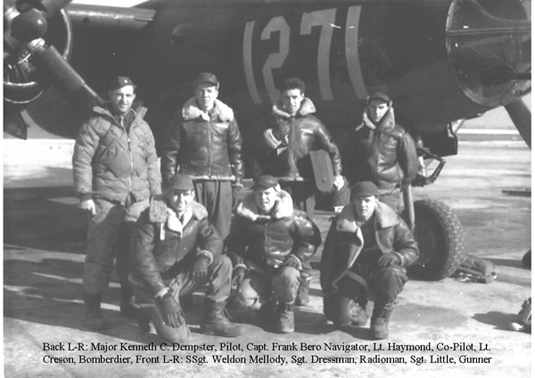
Back L-R: Major Kenneth C.
Dempster (Pilot), Capt. Frank Bero
(Navigator), Lt Haymond (co-pilot), Lt
Creson (Bombardier), Front L-R: SSgt Weldon
Mellody, Sgt Dressman (Radioman), Sgt Little
(Gunner) |
Click here
to read James Mellody biography
Cigarette
An additional piece evidence later came in the form of a
cigarette. Jo Nell Mellody remembers her father-in-law mentioning a
Frenchman who offered him a cigarette. The German soldiers nodded an OK, so
he accepted. This is perfectly in line with the story I heard "a
French guy who was perfectly fluent in English asked the permission to speak
to the POW. The Germans abruptly told him it was
verboten; however, strangely enough, they let him offer a
cigarette to the American."
According to what I heard, the name of that French person
is Mr Ramus. Didier Masfrand recently met with Michel Rialland, 11 in 1944.
Michel remembers seeing the POW throwing away a cigarette butt. He fought
over the butt with his cousin and kept it as a relic for several years.
|
Timestamping
Michael Smith (B26.com)
introduced me to Steve Sharp, a British B26 enthusiast. Steve studied the shadows on the photo and
using
http://pvcdrom.pveducation.org/SUNLIGHT/SUNCALC.HTM he tried to
determine the time at which the photo was taken. He actually used another
print of the same photo. That other print somehow extends a bit further to
the left and shows an additional person. The tip of the shadow of that
person is unfortunately hidden behind a kid that watches the scene and it
was therefore not possible to determine the exact time. He could
nevertheless determine a fairly narrow time frame: between 19.30 and 20.00.
According to the MACR, the B26 was last seen at 19.13
near Sartrouville. The
airman therefore probably landed in the tree around 19.20. It obviously took more than
10 minutes for everything described
here
to happen and then for the soldiers to walk the 300 meters from the tree to
the spot where the photo was taken. The shadows on the photo are therefore
perfectly in terms with the US military archives.
Who took the photo?
So far this question remains unanswered. We would love to
get in touch with the person who took the photo or his family. This person
certainly took some risks and is definitely one of the heroes of the day. We
also suspect that he took more than one photo and that our family has a copy
of this particular shot because my grand-father appears on the photo. Having
a copy of the other photos taken on the same day would certainly be
fascinating. You can contact us if you have
information that could help getting in touch with the photographer.
|
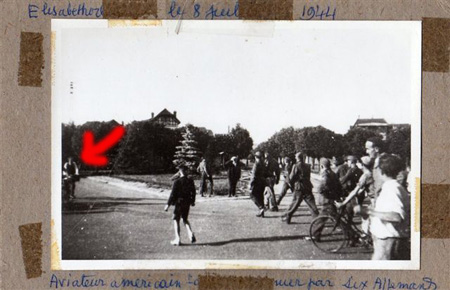 |
|
|
|
B26.com
B26.com is a fantastic resource
about Martin B-26 Marauders. It
contains photos, information,
accounts of the courageous men who
fought on board these bombers during
World War II and played a decisive
role in the liberation of Europe and
the Pacific.
It also contains
a guestbook with fascinating
information contributed by the
veterans themselves, their relatives
and historians. |
|
|
|
Colorization
In 2012, colorization
expert
David Guihur
decided to colorized the photo.
Click here to find out more.
|
|
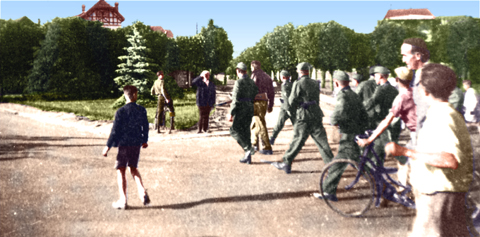 |
Maps
Bruno sent me a US map dating
back to April 1944 and with the help of Marianne, I placed the landing
places of the four airmen that landed in the Epône-Elisabethville area.
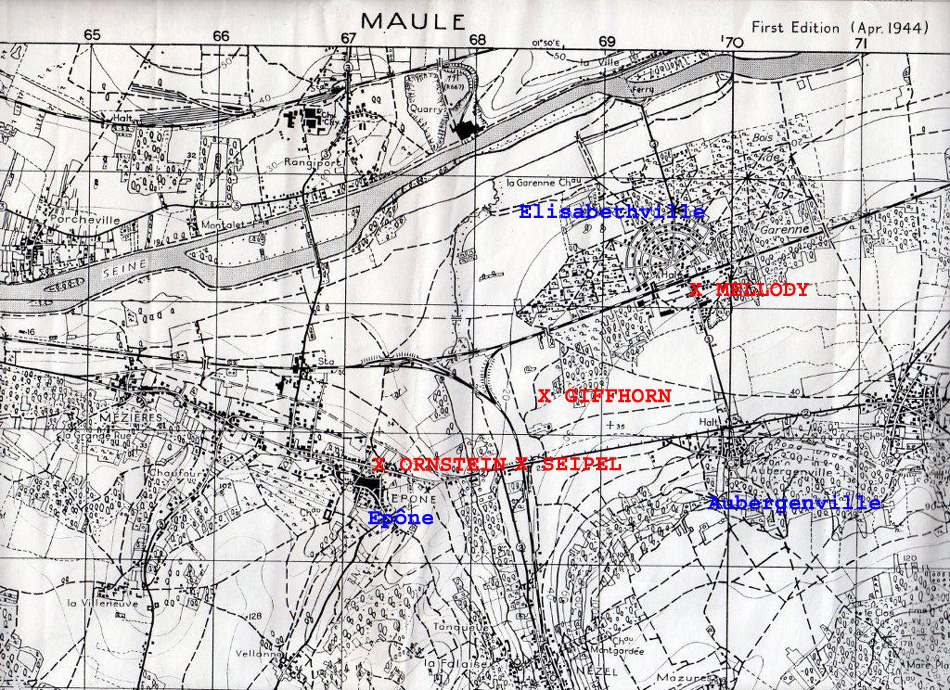
And here is a Google map of the
area;
Click here to access a larger map
and read the comments. NB: comments are in French and English
Media coverage
I would like to thank the media for their coverage of
this historical research hereby helping me getting in touch with people who
came up with interesting information:
Contact Us
If you have some
information that could help us move forwards in our research
and contact these airmen, feel
free to use the form below to contact us:
Philippe Mourand
Source:
http://www.mortsdanslescamps.com/pdf/1994/JO1994p14985-14994ALL.pdf
More information:
http://www.b26.com/page/sartrouville/maisons-laffitte-railroad-bridge-bombardements-1944.htm
http://www.b26.com/page/sartrouville/maisons-laffitte-railroad-bridge-bombardements-1944_p02.htm
http://www.b26.com/marauderman/james_weldon_mellody.htm
Accueil
Rapports d'évasion
Articles
Recherche historique
Contact
Liens externes
Conditions
générales
Politique
de confidentialité
Home
Historical Research POW
Evasion
Reports
Contact
External Links
Terms and Conditions
Privacy Policy |
